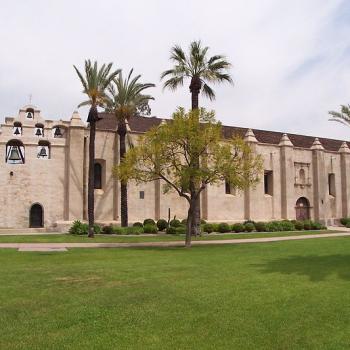Lectionary Reflections
1 Thessalonians 1:1-8
October 19, 2014
This past Saturday, I got in the mood to clean. I asked my husband to set me up a channel on Pandora I could listen to while I cleaned out closets. "What kind of music do you want to hear?"
"Happy music," I replied. So he set me up with a Happy Channel.
I turned up the volume and was happily cleaning to Bruno Mars' "Just the Way You Are," followed by "The Happy Song" by Pharrell, then "Safe and Sound" by Capital Cities, then "Moves like Jagger" by Maroon 5, then "Say Hey" by Michael Franti and Spearhead, then "Ain't No Mountain High Enough" by Marvin Gaye.
And then, at the height of my happy closet cleaning, another song came on. "House of the Rising Sun" by the Animals began to play and ruined my happy buzz.
There is a house in New Orleans
They call the Rising Sun
And it's been the ruin of many a poor boy
And God, I know I'm one
"This is not a happy song," I said to myself. So I called the creator of my Happy Channel to come in and make things right, demanding, "Why is "House of the Rising Sun" on my happy channel?"
He took the remote and showed me how to select "Thumbs Down" on that particular song. The result will be that I will never hear it again on my Happy Channel.
I like it artistically. I have listened to it many times and will again.
But not on my Happy Channel.
As you start out reading the first letter of Paul to the Thessalonians, it plays like the Happy Channel. The first ten verses of the letter praise the Thessalonian church for their example to others, their turning others from idols, their joy even in the midst of persecution.
It continues in this vein throughout. So much so that, if you're not listening carefully, you wonder why the letter needed to be written.
Paul seems to want to produce the "Happy Channel" effect. "I know things are going great for you and you don't need my warnings, but…" At least three times he uses the rhetorical strategy of "I know I don't need to tell you this, but…" (1:8, 4:9, 5:1).
"The word of the Lord has sounded forth from you not only in Macedonia and Achaia but in every place your faith in God has become known, so that we have no need to speak about it" (1 Th. 1:8).
"Now concerning love for brother and sister you do not need to have anyone write to you…" (4:9).
"Now concerning the times and the seasons, brothers and sisters you do not need to have anything written to you…" (5:1).
All of this causes us to ask ourselves, then why are you writing to them about it, Paul, if everything was perfect in Thessalonike?
The city of Thessalonike had a long and colorful history before Paul arrived there in A.D. 50 or 51 in the midst of his so called second missionary journey recorded in Acts 15:40-18:25. The city was part of the Roman Empire, but largely Greek in its influences. The purpose of the letter seems to be to encourage the Church to continue in their zeal for Christ amid the extended period before his return and in the face of specific internal strife and unspecified external persecutions. All was apparently not happy in Thessalonike.
Most scholars attribute 1 Thessalonians to Paul, though some have theories that portions of the letter are later additions. For example, 2:13-16 speaks of God's wrath having overtaken the Jews. This is at odds with Paul's thought elsewhere when we remember that, in 1 Corinthians 2:8 he attributes Jesus' death to "rulers of this age" rather than to the Jews, and that in Romans 11:26 he Paul writes that the Jews have not been abandoned by God for "all Israel will be saved."
Some have theorized that 2:16 is a reference to the destruction of the Temple in A.D. 70, which would postdate the usual date given for the writing of 1 Thessalonians.
It is also sometimes suggested that 1 Thessalonians 5:1-11 is a post-Pauline insertion that has many features of Lukan language and theology that serves as an apologetic correction to Paul's imminent expectation of the Second Coming (1 Thess. 4:13-18).
As I listen to the soundtrack of Paul's letter, there are more than happy songs that make Paul's playlist: his mention of God's wrath overtaking the Jews (1:14-16); his mention of Satan blocking his way to them (2:18); his fear that the tempter had temped the Church and his labor had been in vain (3:5); his fear that there is something lacking in their faith (3:10).
Then comes a list of some pastoral concerns, each couched in language like "As I taught you, as you already know, as I don't need to tell you again…" But yet he does.
The issues seem to concern sexual impropriety (4:3ff), meddling in one another's affairs (4:11f), and the tendency to slack off in their zeal given the delay of the Lord's return.
The final exhortation (5:12-28) speaks volumes about the less-than-happy tunes playing on their channel: They are apparently struggling with lack of respect for one another, with a tendency to keep score and even the score and to experience community strife (5:12-19).





